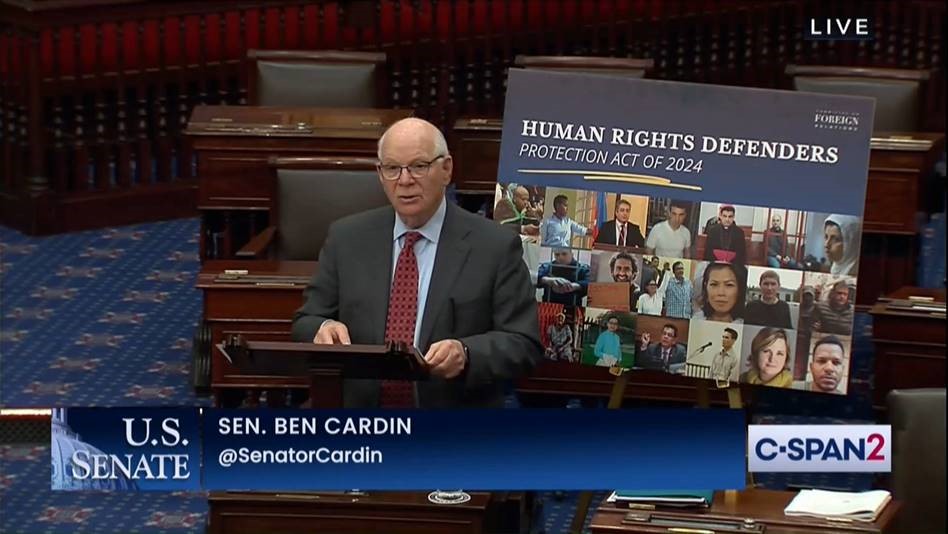Chair Cardin Speaks in Support of Courageous Human Rights Defenders Around the World
WASHINGTON – This week, U.S. Senator Ben Cardin (D-Md.), Chair of the Senate Foreign Relations Committee, delivered remarks on the Senate floor in support of human rights defenders who are attacked for peacefully standing up for human rights and democracy around the world. Chair Cardin also spoke on the introduction of his Human Rights Defenders Protection Act of 2024, and the importance of such legislation to protect these brave individuals who risk their lives to defend freedom.
“Human rights defenders are heroes in the fight for democracy and freedom, and the United States must stand in solidarity with them,” said Chair Cardin. “But we all need to do more. That is why I introduced the Human Rights Defenders Protection Act. This bill enhances our government's ability to prevent and respond to attacks on human rights defenders.”
WATCH THE CHAIR’S FULL REMARKS HERE
Learn more about the Human Rights Defenders Protection Act of 2024 HERE.
A copy of the Chair’s remarks, as delivered, have been provided below.
Madam President, I come to the floor today to express my deep appreciation and gratitude for human rights defenders.
They are the core of free democratic societies. They risk their lives and freedom to hold governments and private sector accountable. They advocate for human rights and political freedom. They protect our environment and fight corruption.
Despite very real threats to their lives and safeties, they have achieved incredible victories. Because of their tireless efforts, from Colombia to Mexico, nations across Latin America expanded reproductive rights. Argentina passed a law to prevent gender-based violence online and hold perpetrators accountable. The EU reached an agreement to require companies to address the human rights and environmental harms of their operations. And Malaysia and Ghana took steps to abolish the death penalty.
We celebrate these victories. But Madam President, I also must underline a deep sense of urgency today. Attacks against human rights defenders are on the rise across the globe. Hundreds are killed each year, and thousands more are attacked, threatened, or imprisoned. The Russian investigative journalist that was brutally attacked for exposing human rights abuses in the Northern Caucuses. The Guatemalan judge forced into exile after holding human rights abusers accountable for their actions during the brutal civil war. The taxi driver and human rights defender in Turkmenistan serving a 22-year sentence in a penal colony for documenting the torture of ethnic minorities. The 28-year-old human rights defender in Sudan who was killed along with his parents and his four brothers. Or one of the hundreds of human rights defenders killed by armed groups vying for control of Colombia's drug trafficking routes.
Not only are attacks growing in scale, today suppressors use sophisticated surveillance technology to target their enemies, even those living in exile. The United Nations Special Rapporteur on Human Rights Defenders has said, “Governments claim that all this repression is about national security. In reality, it is about power and money.” They want to maintain power so they control information. As a result, those who stand for freedom and justice often face death penalty threats, harassment, arbitrary detention, and torture. Women human rights defenders and those working on environmental protection, climate change, LGBTQI+ community issues, and indigenous rights face especially high levels of violence.
I'm pleased that the Biden Administration has made protecting human rights defenders a priority for American foreign policy. Human rights defenders are heroes in the fight for democracy and freedom, and the United States must stand in solidarity with them. But we all need to do more. That is why I introduced the Human Rights Defenders Protection Act.
This bill enhances our government's ability to prevent and respond to attacks on human rights defenders. It requires the administration to come up with a whole-of-government global strategy for human rights defenders. It creates a new limited visa category for at-risk human rights defenders. It elevates the State Department's human rights officers in countries facing democracy and human rights crises. It trains Foreign Service officers on the protection of human rights defenders. And it expands fellowships to allow human rights defenders to conduct research, outreach, and exchanges in the United States.
Madam President, my grandparents came to America in 1902 from Lithuania, where there were pogroms against Jews across Russia and Eastern Europe. The defense of human rights has always been profoundly important to me and my family.
For many decades of my life, the Soviet Union was one of the greatest threats to human rights on Earth, and it seemed indestructible. But I remember standing with my wife at the Berlin Wall in 1987, a symbol of the totalitarianism suffering. My wife and I hammered at the concrete that was covered in graffiti showing crossed-out hammer and sickle.
Chipping away at the Berlin Wall was a reminder of the good we can achieve, if only we have faith. So to everyone who cares about justice, to everyone that fights for freedom, to everyone that defends human rights against all odds, don't give up.
Let us continue to advocate for those human rights defenders behind bars. Let us champion their efforts across the globe. Let us have faith that we can overcome oppression and violence and assassinations. Let us keep hope alive that we can build a world that is safe and peaceful and prosperous.
And with that, Madam President, I urge my colleagues to support the legislation that I have filed, and I yield the floor.
###
